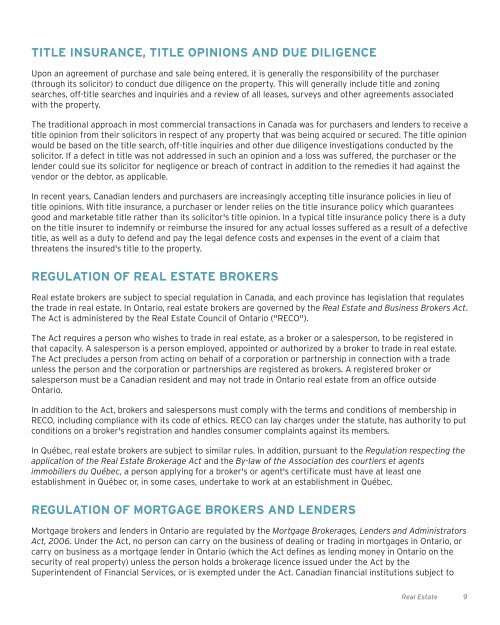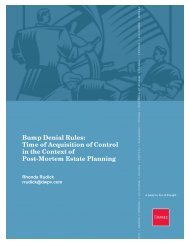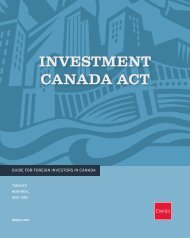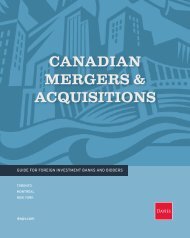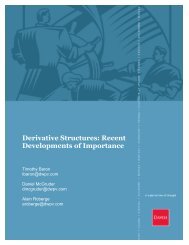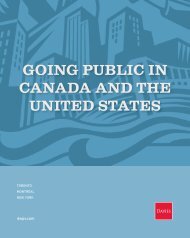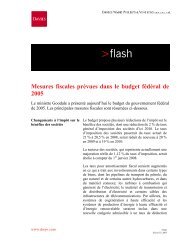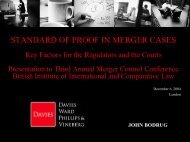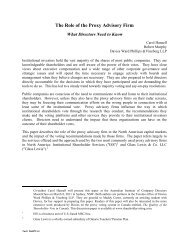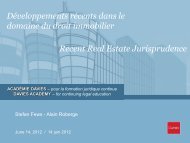ight to restrict the acquisition of land by people who are not citizens or permanent residents, or bycorporations and associations controlled by them.In Ontario, the Aliens' Real Property Act grants non-citizens the same rights as Canadians to hold or dispose ofreal property. Under the Extra-Prov<strong>in</strong>cial Corporations Act, a corporation <strong>in</strong>corporated outside of Canada mustobta<strong>in</strong> an extra-prov<strong>in</strong>cial licence to acquire, hold or convey real property <strong>in</strong> Ontario, but such licences are easilyobta<strong>in</strong>ed.In Québec, pursuant to An Act respect<strong>in</strong>g the acquisition of farm land by non-residents, non-residents of Québeccannot acquire farm land unless they receive the authorization of the Commission de protection du territoireagricole du Québec, the authority <strong>in</strong> charge of preserv<strong>in</strong>g agricultural land <strong>in</strong> Québec. Some other prov<strong>in</strong>ceshave similar restrictions to preserve agricultural land.LAND USE PLANNINGIn Ontario, the Plann<strong>in</strong>g Act provides the pr<strong>in</strong>cipal means for the government to control the development anduse of land. Land use plann<strong>in</strong>g is the responsibility of the prov<strong>in</strong>cial government and is supervised at theprov<strong>in</strong>cial level, but significant plann<strong>in</strong>g functions have been delegated to the various regional governments andmunicipalities. Land use is controlled through such <strong>in</strong>struments as the official plan (a long-range general planfor a region or municipality) and zon<strong>in</strong>g by-laws (which regulate, for each parcel of land <strong>in</strong> the municipality, theuses permitted and other matters such as required park<strong>in</strong>g and the type, size, height and location of build<strong>in</strong>gsand structures). For a purchaser of land, both the official plan and particular zon<strong>in</strong>g by-laws are crucial. Mostmunicipalities require that site plans be approved before the construction of any new development. Site plansset out the details of a development (<strong>in</strong>clud<strong>in</strong>g the location of build<strong>in</strong>gs and related facilities, such aslandscap<strong>in</strong>g, services, driveways and park<strong>in</strong>g spaces). Most municipalities also require the developer to enter<strong>in</strong>to an agreement ensur<strong>in</strong>g construction and ongo<strong>in</strong>g ma<strong>in</strong>tenance <strong>in</strong> accordance with the site plans.In Ontario, any subdivision of land requires the consent of the local committee of adjustment or subdivisioncontrol committee pursuant to the Plann<strong>in</strong>g Act. This requirement also applies to a mortgage or the grant of anyother <strong>in</strong>terest <strong>in</strong> land (such as a lease) for 21 years or more (<strong>in</strong>clusive of all renewals), where the mortgage or<strong>in</strong>terest is granted over only part of a landhold<strong>in</strong>g. The failure to obta<strong>in</strong> such a consent when otherwise requiredwill result <strong>in</strong> the failure of the deed, mortgage or lease to create any <strong>in</strong>terest <strong>in</strong> the real property. Although thereare a number of exemptions to the requirement for consent, most contracts for the purchase of real property <strong>in</strong>Ontario are made subject to any required consent, and the cost and responsibility for obta<strong>in</strong><strong>in</strong>g such consents isusually allocated to the vendor. Anyone wish<strong>in</strong>g to subdivide land <strong>in</strong> Ontario or to subdivide and sell lots mustobta<strong>in</strong> governmental consent and may be required to submit a draft plan of subdivision for approval. Normally,the municipality will require the developer to enter <strong>in</strong>to development agreements with it, whereby the developeragrees to provide sewers, roads and other services for the subdivision, the dedication of certa<strong>in</strong> lands for publicuse and certa<strong>in</strong> other public benefits.In Québec, An Act respect<strong>in</strong>g land use plann<strong>in</strong>g and development gives to each municipality the responsibility forthe adm<strong>in</strong>istration of its territory for municipal purposes. The regional county municipality adopts adevelopment plan sett<strong>in</strong>g out general land development policies for the territory as well as the general policieson land use for different parts of the territory. The plan applies to all municipalities with<strong>in</strong> the regional countymunicipality. In turn, the council of each municipality has the power to adopt zon<strong>in</strong>g, subdivision and build<strong>in</strong>g bylawsfor the whole or any part of its territory, but these by-laws must be consistent with the objectives of thedevelopment plan. Municipal councils may impose certa<strong>in</strong> conditions for the approval of subdivisions, such asm<strong>in</strong>imum lot areas and dimensions and provisions for rights-of-way.In the case of metropolitan communities <strong>in</strong> Québec, the metropolitan community adopts a metropolitan land useand development plan that sets out general policies. This general plan is carried out by the city, which haspowers similar to those of a local municipality under An Act respect<strong>in</strong>g land use plann<strong>in</strong>g and development.8 Real Estate
TITLE INSURANCE, TITLE OPINIONS AND DUE DILIGENCEUpon an agreement of purchase and sale be<strong>in</strong>g entered, it is generally the responsibility of the purchaser(through its solicitor) to conduct due diligence on the property. This will generally <strong>in</strong>clude title and zon<strong>in</strong>gsearches, off-title searches and <strong>in</strong>quiries and a review of all leases, surveys and other agreements associatedwith the property.The traditional approach <strong>in</strong> most commercial transactions <strong>in</strong> Canada was for purchasers and lenders to receive atitle op<strong>in</strong>ion from their solicitors <strong>in</strong> respect of any property that was be<strong>in</strong>g acquired or secured. The title op<strong>in</strong>ionwould be based on the title search, off-title <strong>in</strong>quiries and other due diligence <strong>in</strong>vestigations conducted by thesolicitor. If a defect <strong>in</strong> title was not addressed <strong>in</strong> such an op<strong>in</strong>ion and a loss was suffered, the purchaser or thelender could sue its solicitor for negligence or breach of contract <strong>in</strong> addition to the remedies it had aga<strong>in</strong>st thevendor or the debtor, as applicable.In recent years, Canadian lenders and purchasers are <strong>in</strong>creas<strong>in</strong>gly accept<strong>in</strong>g title <strong>in</strong>surance policies <strong>in</strong> lieu oftitle op<strong>in</strong>ions. With title <strong>in</strong>surance, a purchaser or lender relies on the title <strong>in</strong>surance policy which guaranteesgood and marketable title rather than its solicitor's title op<strong>in</strong>ion. In a typical title <strong>in</strong>surance policy there is a dutyon the title <strong>in</strong>surer to <strong>in</strong>demnify or reimburse the <strong>in</strong>sured for any actual losses suffered as a result of a defectivetitle, as well as a duty to defend and pay the legal defence costs and expenses <strong>in</strong> the event of a claim thatthreatens the <strong>in</strong>sured's title to the property.REGULATION OF REAL ESTATE BROKERSReal estate brokers are subject to special regulation <strong>in</strong> Canada, and each prov<strong>in</strong>ce has legislation that regulatesthe trade <strong>in</strong> real estate. In Ontario, real estate brokers are governed by the Real Estate and Bus<strong>in</strong>ess Brokers Act.The Act is adm<strong>in</strong>istered by the Real Estate Council of Ontario ("RECO").The Act requires a person who wishes to trade <strong>in</strong> real estate, as a broker or a salesperson, to be registered <strong>in</strong>that capacity. A salesperson is a person employed, appo<strong>in</strong>ted or authorized by a broker to trade <strong>in</strong> real estate.The Act precludes a person from act<strong>in</strong>g on behalf of a corporation or partnership <strong>in</strong> connection with a tradeunless the person and the corporation or partnerships are registered as brokers. A registered broker orsalesperson must be a Canadian resident and may not trade <strong>in</strong> Ontario real estate from an office outsideOntario.In addition to the Act, brokers and salespersons must comply with the terms and conditions of membership <strong>in</strong>RECO, <strong>in</strong>clud<strong>in</strong>g compliance with its code of ethics. RECO can lay charges under the statute, has authority to putconditions on a broker's registration and handles consumer compla<strong>in</strong>ts aga<strong>in</strong>st its members.In Québec, real estate brokers are subject to similar rules. In addition, pursuant to the Regulation respect<strong>in</strong>g theapplication of the Real Estate Brokerage Act and the By-law of the Association des courtiers et agentsimmobiliers du Québec, a person apply<strong>in</strong>g for a broker's or agent's certificate must have at least oneestablishment <strong>in</strong> Québec or, <strong>in</strong> some cases, undertake to work at an establishment <strong>in</strong> Québec.REGULATION OF MORTGAGE BROKERS AND LENDERSMortgage brokers and lenders <strong>in</strong> Ontario are regulated by the Mortgage Brokerages, Lenders and Adm<strong>in</strong>istratorsAct, 2006. Under the Act, no person can carry on the <strong>bus<strong>in</strong>ess</strong> of deal<strong>in</strong>g or trad<strong>in</strong>g <strong>in</strong> mortgages <strong>in</strong> Ontario, orcarry on <strong>bus<strong>in</strong>ess</strong> as a mortgage lender <strong>in</strong> Ontario (which the Act def<strong>in</strong>es as lend<strong>in</strong>g money <strong>in</strong> Ontario on thesecurity of real property) unless the person holds a brokerage licence issued under the Act by theSuper<strong>in</strong>tendent of F<strong>in</strong>ancial Services, or is exempted under the Act. Canadian f<strong>in</strong>ancial <strong>in</strong>stitutions subject toReal Estate 9
- Page 1 and 2: DOING BUSINESSIN CANADAYOUR COMPLET
- Page 3 and 4: ONTENTSTABLE OF CONTENTSINTRODUCTIO
- Page 5 and 6: IntroductionPOLITICAL AND CONSTITUT
- Page 7 and 8: 5RealEstateIndustrial and Intellect
- Page 9: accordance with directions from the
- Page 13 and 14: 11EnvironmentalLawIndustrial and In
- Page 15 and 16: commercial activities, or carrying
- Page 17 and 18: The federal government currently re
- Page 19 and 20: 17Types ofBusiness OrganizationIndu
- Page 21 and 22: provincial law cannot do so as of r
- Page 23 and 24: partnership, limited partners’ li
- Page 25 and 26: parties. In Québec, joint venturer
- Page 27 and 28: 25Financing aBusiness OperationIndu
- Page 29 and 30: The Civil Code of Québec provides
- Page 31 and 32: 29CorporateGovernanceIndustrial and
- Page 33 and 34: Instrument 58-101. The practices re
- Page 35 and 36: 33CompetitionLawIndustrial and Inte
- Page 37 and 38: BID-RIGGINGBid rigging is any agree
- Page 39 and 40: anticompetitive agreements among co
- Page 41 and 42: 39ForeignInvestmentIndustrial and I
- Page 43 and 44: apply for Canadian citizenship. (Pe
- Page 45 and 46: (D)GENERAL REVIEW THRESHOLDSThe fol
- Page 47 and 48: there be an "acquisition of control
- Page 49 and 50: Industrial and Intellectual Propert
- Page 51 and 52: to perform or cause them to be perf
- Page 53 and 54: Registration grants an exclusive ri
- Page 55 and 56: PIPEDA applies in all provinces of
- Page 57 and 58: Employment LawCanadian employment l
- Page 59 and 60: displacement, laying-off, suspensio
- Page 61 and 62:
easonable cause to believe that the
- Page 63 and 64:
63Retirement Plans, EmployeeBenefit
- Page 65 and 66:
• funding;• eligibility;• pen
- Page 67 and 68:
67Temporary Entry andPermanent Resi
- Page 69 and 70:
INTERNATIONAL AGREEMENTSIn recent y
- Page 71 and 72:
immigrant in another class, he or s
- Page 73 and 74:
73Bankruptcy andInsolvency Proceedi
- Page 75 and 76:
BANKRUPTCYBankruptcy results in the
- Page 77 and 78:
INTERNATIONAL BANKRUPTCYASSETS LOCA
- Page 79 and 80:
Tax ConsiderationsThis chapter prov
- Page 81 and 82:
TAX REPORTINGAnnual Tax ReturnsCana
- Page 83 and 84:
Québec has legislation that limits
- Page 85 and 86:
Amendments, SIFTs and their unithol
- Page 87 and 88:
Conversely, where a Canadian reside
- Page 89 and 90:
A person, whether resident in Canad
- Page 91 and 92:
APPENDIX I: CANADA’S IN FORCE TAX
- Page 93:
TORONTODAVIES WARD PHILLIPS & VINEB


